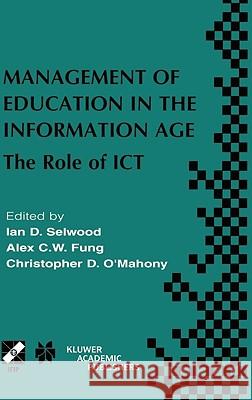Management of Education in the Information Age: The Role of Ict » książka
Management of Education in the Information Age: The Role of Ict
ISBN-13: 9781402074301 / Angielski / Twarda / 2003 / 210 str.
At two previous conferences of Working Group 3. 7, the evaluation of the implementation of computerised school information systems (SISs) in Hong Kong and The Netherlands were presented. Here, we will present the results of similar research in England. The rationale for these studies was to fill the gap in our knowledge on this important type of computer use in schools, and, by that, to gain insight into the factors that prove to promote successful SIS- implementation. In England SIMS (School Information Management System) has the largest market share of computerised school administration systems. SIMS is a modular but integrated system in that once entered, data is available between modules. Briefly, SIMS consists of about twenty modules that support the work of clerical staff and school managers and teachers (for details see Wild & Walker 2001). 2. RESEARCH QUESTIONS AND RESEARCH FRAMEWORK The following questions were addressed: - The extent of, and ways in which SIMS was used in schools; - The user opinion on the quality of SIMS; The nature and effects of the implementation process, and the characteristics of the schools into which SIMS was introduced; - Factors affecting the degree of SIMS use. The variables relating to the above issues that were investigated in this study fell into five distinct categories according to Visscher's model (see Figure 1), i. e., features of SIMS use, the implementation process, school organisation, and the intendedlunintended effects. The study assumed possible interrelationships between all these variable groups.











